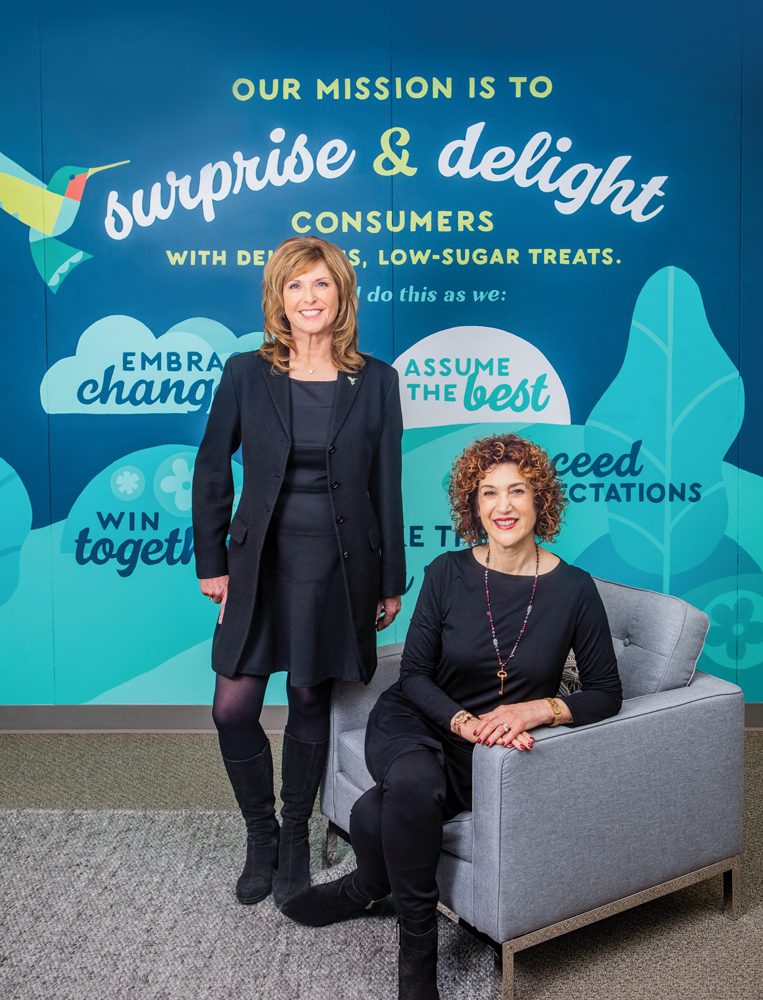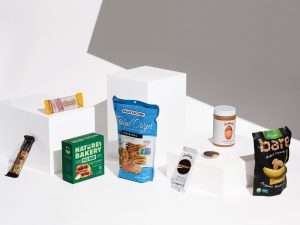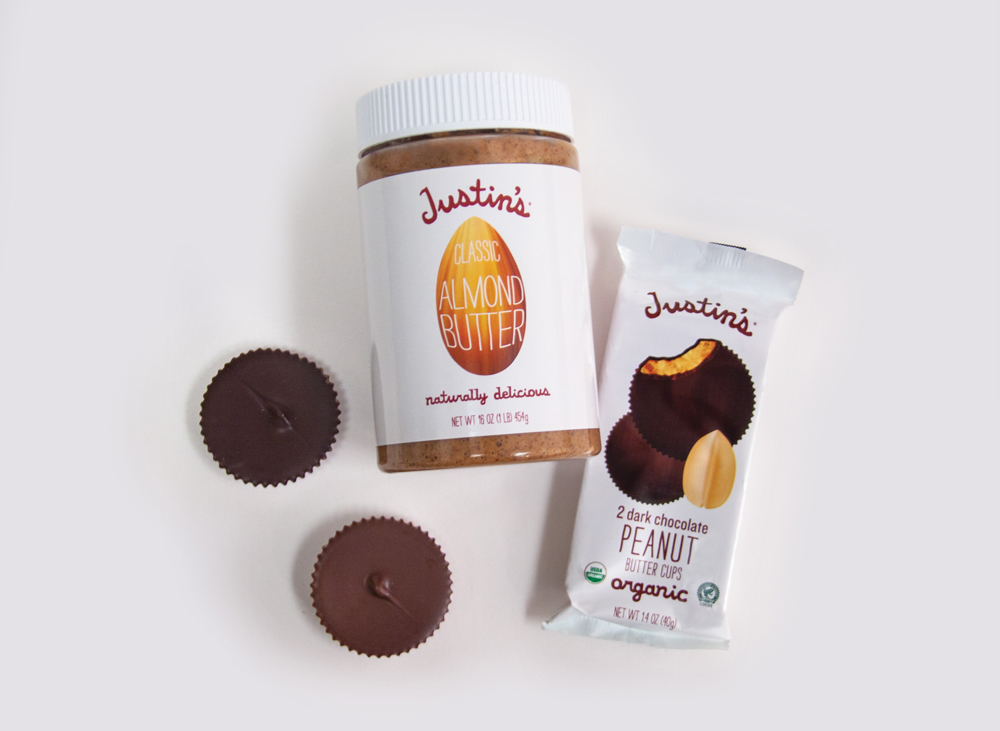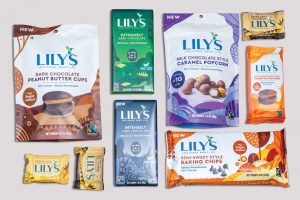Growing a Healthy Portfolio
Earnings rank low when VMG Partners evaluates a potential investment. Instead, the firm guides its companies based on their needs and helps founders meet their goals.

If you want to make a quick trip to the grocery store, don’t go with Robin Tsai or Wayne Wu, general partners of private equity firm VMG Partners.
“It becomes a very long, drawn-out process,” Wu says. “We enjoy taking a look at every item on the shelf, both things that are a part of our portfolio and new and interesting things that we find.”
Since 2005, the San Francisco-based firm has invested in early-stage health and wellness brands, including Kind Bar and the maker of Pirate’s Booty. Led by its five general partners, VMG has invested in 42 companies and sold 18 of them to strategic buyers—often large publicly traded companies like Mondelēz International and Hormel Foods.
For every founder-led company that VMG helps transform into an acquisition target, there’s another reason for Tsai and Wu to pause in the grocery aisle. “We’ll say, ‘All these crazy things happened with this company, and this other company had to switch co-manufacturers,’” Wu says. “We annoy our wives, because sometimes they just want to buy peanut butter.”
Guilt-free Discoveries
VMG’s investment focus— health and wellness—is a category that’s increasingly pervasive. That’s reflected in its portfolio, which spans food and beverage, supplements, skin care and even pet food.
VMG Partners
Year Founded: 2005
Investment Focus: Early-stage consumer brands
General Partners: David Baram, Kara Cissell-Roell, Mike Mauzé, Robin Tsai and Wayne Wu
Number of Investments to Date: 42
Exits to Strategic Buyers: 18 companies sold to buyers that include Mondelēz International, Hormel Foods, Shiseido and others
In addition to Tsai and Wu, VMG’s general partners are David Baram, Kara Cissell-Roell and Mike Mauzé. The firm doesn’t attribute deals to any one individual—instead, the team celebrates its wins collectively.

When evaluating a potential investment, EBITDA is low on VMG’s list of criteria. Instead, the firm considers whether a company could become an iconic brand in the future. According to Wu, the VMG team asks, “Are consumers buying and coming back for more? Is the category large enough? And is there a health and wellness trend happening within that category that’s incrementally changing for the better?”
“We enjoy taking a look at every item on the shelf, both things that are a part of our portfolio and new and interesting things that we find.”
Wayne Wu
General Partner, VMG Partners
VMG has a reputation as a founder-focused investor. It looks for entrepreneurs that share its vision for where a business will be in three-to-five years. It’s hard enough to groom an early-stage business into an acquisition target, says Tsai, but “it’s almost impossible if you don’t have the same goals from the outset.”
Unlike some private equity models, VMG doesn’t employ a one-size-fits-all approach. “What sometimes happens in our industry is someone has one singular success, and then they try to extrapolate what worked there and throw that into the next business,” Wu says. In contrast, VMG pulls from a large sample size of data and knowledge to guide companies based on their needs. Instead of issuing directives, it suggests best practices to help founders meet their goals.
Before VMG invested in Lily’s—a producer of stevia-sweetened chocolate products—in 2018, founder Cynthia Tice says she didn’t have any experience with private equity. But she knew VMG had a reputation for being founder-friendly and that the firm focused on natural products, both of which were important to her as she sought to maintain Lily’s values.
She recalls a memorable early conversation with Wu. “He said, ‘Let’s sign an NDA and then we’ll review your business, and if we’re interested, we’ll tell you. And if we’re not interested, we’ll tell you why.’” Tice says she appreciated that forthright approach: “It’s remained such a true part of our relationship—transparency and openness, and just real fairness.”
That mindset is crucial for VMG’s emphasis on fixing problems faced by early-stage businesses, instead of pointing fingers. “We’re used to the turbulence that all those businesses have,” Tsai says. “We’re not going to be surprised when things go sideways because things always go sideways with small businesses.”
Bill Creelman, founder and CEO of sparkling water-maker Spindrift, discovered that was true when a business crisis struck in the midst of his discussions with VMG. After more than five years of building the Spindrift brand, he was about to lose the rights to the name. “We had a coexistence agreement and it was challenged,” Creelman says. “I had to sit down with Robin [Tsai] and explain that we were likely going to have to change our name.”
VMG’s reaction was comforting, he says. “They told me that these things happen, and let’s try to figure out a way to resolve that.” Over the next couple of months, VMG’s counsel helped solve the name dispute. “Today we are Spindrift,” Creelman says. “That was incredibly telling and gave me a lot of confidence in terms of how they would react when things inevitably go wrong.”
Soup-to-Nuts Guidance
Justin Gold knows how it feels when things go wrong. The company he founded, Justin’s, a maker of nut butters and snacks like organic peanut butter cups, faced two catastrophic events in 2010. First, Justin’s vice president of sales and marketing, who’d been instrumental in growing the company, died of brain cancer. A few months later, Justin’s faced a recall after its supplier was linked to salmonella-tainted products sold through Trader Joe’s. Because the supplier didn’t keep good records, “they had to recall everything that came out of their factory, which implicated us,” Gold says.

He calls that period “the lowest I’d ever been.” He questioned whether he was working with the right suppliers and contract manufacturers, and whether he could take his namesake brand to the next phase of growth. He recalls wondering, “Can I scale this business if it does take off and is successful?” As Gold says, he wasn’t looking for more funding; he was looking for “smart money.”
Gold met with about a half-dozen equity investors and VMG was not initially at the top of his list. Although the firm had the most capital under management and was the largest organization overall, Gold’s perception was that “bigger isn’t necessarily better.” But VMG changed his mind at their first meeting. Unlike other firms, the VMG team came with data about Justin’s business and the broader market. At that meeting, “they taught me things about my company and my category that I didn’t already know,” he says. “The other companies came to the meeting completely uninformed.”
As VMG helped Justin’s develop into an acquisition target, it used the same general approach it applies to all of its portfolio companies: Consider the priorities of a strategic buyer in a particular product category and work from there. “We really think about building backwards,” Tsai says. Depending on the category— whether it’s food and beverage or personal care and beauty—strategic acquirers will have different priorities around metrics like revenue growth or gross margins, he adds.
Financial performance isn’t VMG’s highest priority when working with young businesses. For early-stage companies, other metrics matter, too, such as intellectual property and supply chains. To develop those areas, companies need the right team. “That’s probably the thing that we spend the most amount of time on right at the beginning: evaluation of the current team, trying to understand whether or not there are near-term holes that we want to fill,” Tsai says.
In the case of Justin’s, Gold agreed the business required new leadership. “What I didn’t want to do was hold back my organization,” he says. In 2014, former Celestial Seasonings president Peter Burns took over as CEO.
When VMG invested in 2013, Justin’s had 13 employees. Over the next two years, that grew to 45. Gold estimates the company’s margins improved by about 25%. He credits VMG with ensuring Justin’s had critical details in place, such as intellectual property rights. VMG also helped with another important improvement. When the firm invested, Justin’s had two contract manufacturers—within a year, that increased to eight. This helped drive down costs, created capacity to scale and provided redundancy.
When food giant Hormel Foods acquired Justin’s in 2016, the company’s growth rate was in the double digits, which was “extremely interesting to us,” says Fred Halvin, Hormel’s vice president of corporate development.
Justin’s also had significant market share in the premium nut butter category, which would complement Hormel’s Skippy brand. “The question was, has it been professionalized enough to be owned by a large organization like us?” Halvin recalls. The answer was yes. He credits VMG with building a strong team and establishing policies and discipline within the company that made Hormel comfortable.
 When evaluating a business, Hormel looks for brands that are in the top two market positions within a growing category. It wants to see operating profit margins of 13-15%. For younger businesses, it will settle for lower margins if there’s a path to increase them within three or four years, Halvin says.
When evaluating a business, Hormel looks for brands that are in the top two market positions within a growing category. It wants to see operating profit margins of 13-15%. For younger businesses, it will settle for lower margins if there’s a path to increase them within three or four years, Halvin says.
Three years ago, Hormel would only consider businesses with roughly $50 million in annual revenue. Now the company looks at earlier stage businesses between $5 million and $20 million— particularly ones that have a point of differentiation and can leverage Hormel’s scale to accelerate distribution. Consumers looking for new experiences are becoming more aware of these brands through social media, Halvin says, noting that wasn’t as much the case five years ago.
“The truth is, so many of these brands have incredible back stories—difficult times, great wins.”
Robin Tsai
General Partner, VMG Partners
Hormel works to maintain the brand integrity of its acquisitions, which is why Justin’s operates as a standalone business. “There’s a DNA that’s associated with how the consumer perceives the brand,” he says. Hormel doesn’t want “the large corporation footprint” to overshadow a company’s image.
Perfect Partners
Like Hormel, Mondelēz International’s acquisition strategy has followed shifts in consumer behavior. That includes snacking as a meal replacement. Glen Walter, executive vice president and president, North America, at the food and beverage conglomerate has seen that evolution firsthand.
“When I was growing up, you got three square meals and my mom or dad would say, ‘Snacking is going to ruin your lunch and your dinner,’” he says. In November, the company released a report, based on a Harris poll, indicating that 60% of adults (and 70% of millennials) preferred to eat multiple small meals throughout the day, rather than a few large ones.
Mondelēz has “a bold ambition to be the leader in broader snacking,” Walter says, and that means adding new snacks to complement its portfolio of iconic brands, which include Ritz and Oreo.
In 2019, Mondelēz bought Perfect Snacks, a maker of refrigerated protein bars, from VMG. The business fit with Mondelēz’s view that refrigerated snacking is a growing category. Through Mondelēz’s due diligence, it found that VMG had helped Perfect Snacks make informed decisions that not only delivered financial returns but set up the business for the future, Walter says.
For one, VMG helped Perfect Snacks expand its retail footprint. When VMG invested in 2015, the company’s products were sold at 5,000 retailers. By the time Mondelēz purchased Perfect Snacks, its bars were available at 27,000 retailers, including Target, Trader Joe’s, Starbucks and Walmart.
As the first refrigerated bar on the market, getting into stores wasn’t easy at first. As Bill Keith, Perfect Snacks’ CEO and co-founder, recalls, “We told VMG, ‘We’re having a tough time getting through the clutter in the refrigerated section.’” The firm helped Perfect Snacks change its pricing strategy, after analyzing pricing data and looking at strategies that worked for other VMG companies. “That was a big boost for us,” Keith says.
Sharing information across the portfolio and fostering collaboration are vital to VMG’s success. “It’s hard enough building an entrepreneurial brand, just in itself,” Tsai says. “Having any type of edge— where they can move a little quicker, increase their odds in all these different facets—can really help increase the overall profitability and odds of success.”

In one example of that collaboration, VMG connected Lily’s with Perfect Snacks, which had a strong analytical team and robust forecasting models. Both companies were growing rapidly, so it was helpful for Lily’s to learn how Perfect Snacks had developed internal tools to tie consumption to shipments, says Jane Miller, Lily’s CEO. Brought in by VMG, Miller also served on Justin’s board.
Now, when VMG brings new portfolio companies on board, it asks Lily’s to give an Analytics 101 presentation, to show how valuable those forecasting models can be for a fast-growing business.
Having access to insights from peers can be useful for companies growing at a rapid clip. In December 2019, wellness data tracker SPINS reported that Lily’s 52-week revenue was $75 million, up 83% from the year before. “I’ve worked in a lot of companies in 35 years but have never run anything that was growing this fast,” Miller says.
“I’ve worked in a lot of companies in 35 years but have never run anything that was growing this fast.”
Jane Miller
CEO, Lily’s
Since VMG invested in Lily’s in 2018, the company has introduced about 25 new products, including chocolate-covered caramels and chocolate-covered popcorn. Its staff has grown from four employees to 40 and expanded its retail footprint significantly. Last year, it added new retail customers, including Walmart and Target, and further expanded its product offerings in stores where its relationships predated VMG’s investment, like Kroger, Publix and Whole Foods.
Spindrift’s Creelman says his company, too, has benefited from the advice of other VMG holdings, on topics like hiring and supply chain—a critical area for his business, which sources produce for the natural fruit juice used to flavor Spindrift sparkling water.
Spindrift offered three flavors when VMG invested in December 2015; today, it has 10. Over that period, the company’s headcount has tripled, from around 30 employees to 110.

Grab the Popcorn
Even as it works hard to build early-stage companies into attractive acquisition targets, VMG also wants to support and guide as many entrepreneurs, strategic buyers and retailers as possible—regardless of whether they will ever join the portfolio, acquire a VMG company or sell products from a VMG brand.
“A core fundamental criticism we have of our industry is that folks are too deal-focused, where they’re constantly chasing the next deal,” Wu says. Instead, he believes that by giving back to the community, deals will follow. In his view, being a good citizen in the better-for-you category helps bring more attention to health and wellness products.
The category is certainly drawing attention, and the ascendance of healthier products is on full display in grocery aisles. Although their spouses might dread a family shopping trip, for Wu and Tsai, these errands hold an almost cinematic appeal.
“I love knowing the back story of so many of these brands,” Tsai says. “It’s almost like … when you’re watching a movie, you’re only seeing the finished product, you’re only seeing what folks are excited to show you. But the truth is, so many of these brands have incredible back stories—difficult times, great wins.”
VMG’s role in the narrative arc of these businesses contributes to the allure. “I think that each one is kind of a story unto itself,” Tsai adds. “It’s just very cool to have been part of that.”
This story originally appeared in the March/April 2020 print edition of Middle Market Growth magazine. Read the full issue in the archive.
S.A. Swanson is a business writer based in the Chicago area.


